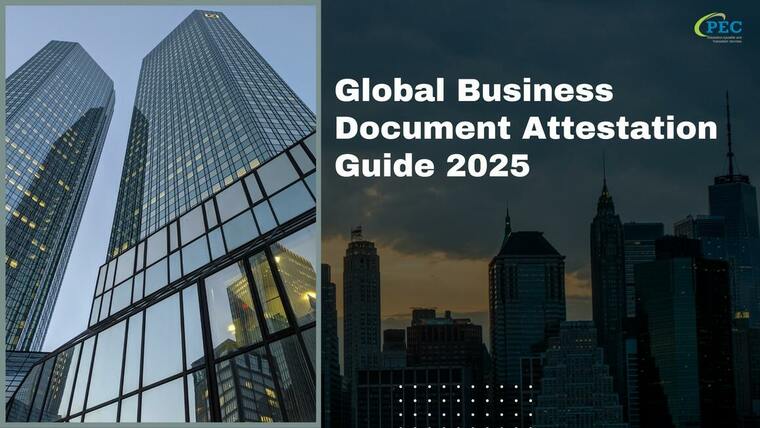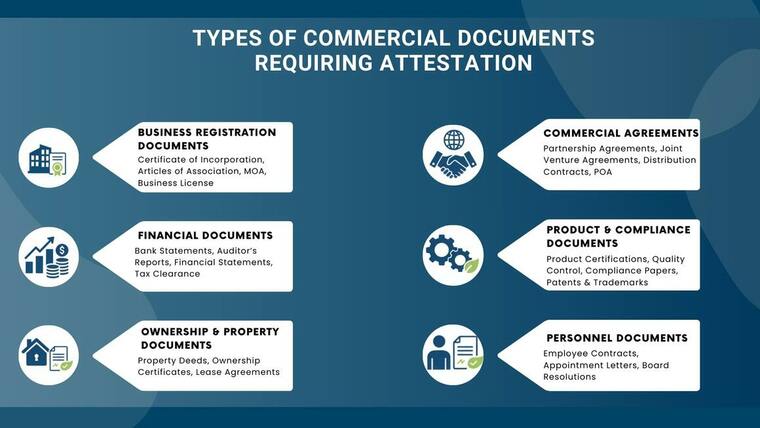Global Business Document Attestation Guide 2025

Table of Content
- Introduction
- Why Document Attestation is Crucial for International Business
- Types of Commercial Documents Requiring Attestation
- The Document Attestation Process in 2025
- Digital Transformation in Document Attestation
- Common Challenges and Solutions in Document Attestation
- FAQs: Attesting Commercial Documents for Global Expansion (2025)
- Conclusion
As the world economy continues to globalize, the potential for your business to grow from selling products and services internationally is immense. However, international business expansion will require you to navigate a legally difficult environment of laws and regulations – specifically related to document attestation - which is needed for a legal acceptance of documents across national lines. As of 2025 the environment of commercial document attestation is changing rapidly with the development of new technologies, new regulations and procedures. This comprehensive guide will summarize exactly what you need to know about attesting your commercial documents for your own international business expansion in 2025.
Why Document Attestation is Crucial for International Business
Proper document attestation serves several critical purposes in international business:
- Legal Compliance
- Business Credibility
- Regulatory Approval
- Financial Transactions
- Contract Enforcement
According to the International Chamber of Commerce, businesses that properly authenticate their documents experience 40% fewer regulatory delays when expanding into new markets.
Types of Commercial Documents Requiring Attestation
When expanding your business abroad, various documents typically require attestation. These include:

- Business Registration Documents: Certificate of Incorporation, Articles of Association, Memorandum of Association, Business License
- Financial Documents: Bank statements, Auditor's reports, Financial statements, Tax clearance certificates
- Ownership and Property Documents: Property deeds, Ownership certificates, Lease agreements
- Commercial Agreements: Partnership agreements, Joint venture agreements, Distribution agreements, Power of Attorney documents
- Product and Compliance Documents: Product certifications, Quality control certificates, Compliance documentation, Patents and trademarks
- Personnel Documents: Employee contracts, Executive appointment letters, Board resolutions
The Document Attestation Process in 2025
The business document attestation process has evolved significantly in 2025. Here's the typical process:
Step 1: Document Preparation and Notarization
The process begins with preparing the necessary documents and having them notarized by a certified notary public in your home country. The notary verifies your identity as the signatory and confirms that you signed the documents willingly.
Step 2: State/Provincial Authentication
After notarization, documents typically need to be authenticated by the relevant state or provincial authority. This step verifies the notary's credentials and authority.
Step 3: Federal Authentication
The next level involves authentication by a federal government body, such as the Department of State or Foreign Affairs Ministry. This step confirms that the state/provincial authentication is legitimate.
Step 4: Embassy/Consulate Legalization
Finally, the documents must be legalized by the embassy or consulate of the destination country. This step confirms that the documents will be recognized in the target country.
2025 Update: The Hague Apostille Convention continues to expand, with several new countries joining in 2024-2025. For member countries, the federal authentication (Apostille) is typically the final step, eliminating the need for embassy legalization. This has significantly reduced processing times for businesses expanding into these countries.
Digital Transformation in Document Attestation
2025 has seen remarkable advancements in digital solutions for document attestation. These innovations are transforming how businesses handle international document verification:
- Blockchain-Based Verification
- Digital Apostilles
- AI-Powered Document Verification
- Unified Digital Platforms
Common Challenges and Solutions in Document Attestation
Challenge 1: Varying Requirements by Country
Solution: Utilize specialized document attestation services that maintain updated databases of country-specific requirements. In 2025, AI-powered compliance platforms can automatically identify the exact requirements for your target country.
Challenge 2: Long Processing Times
Solution: Plan well in advance and utilize digital attestation options where available. Many businesses now begin the attestation process 3-6 months before their planned expansion date.
Challenge 3: Document Rejection
Solution: Work with professional attestation services that pre-screen documents for compliance. In 2025, verification software can identify potential rejection issues before submission.
Challenge 4: Keeping Up with Regulatory Changes
Solution: Subscribe to regulatory update services or work with legal consultants specializing in international business. Many countries now offer notification systems for regulatory changes affecting foreign businesses.
FAQs: Attesting Commercial Documents for Global Expansion (2025)
1. What is commercial document attestation?
The process of verifying business documents (e.g., incorporation certificates, contracts) for legal acceptance abroad. Required for compliance, credibility, and operational setup in foreign markets.
2. Which documents need attestation?
Key documents: Certificate of Incorporation, Articles of Association, financial statements, Power of Attorney, commercial agreements, and compliance certificates. Country-specific rules apply.
3. How has attestation changed in 2025?
Digital Apostilles (e-Apostilles), blockchain verification, and AI pre-screening now reduce processing time by 65% and costs by 40%. The Hague Convention expanded to 120+ countries.
4. Can I use digital attestation everywhere?
Yes in Hague Convention countries (EU, US, UAE). Non-Hague nations (China, Saudi Arabia) may require physical legalization. Always verify per country.
5. Why do documents get rejected?
Top reasons: Incomplete info, non-certified translations, wrong attestation path (e.g., skipping embassy steps), or outdated formats. Use AI tools to pre-screen.
Conclusion
As businesses continue to expand globally in 2025, proper document attestation remains a critical component of successful international growth. The landscape is evolving rapidly, with digital transformation, new technologies, and streamlined processes creating both opportunities and challenges.
We have trustworthy document legalization services from companies like PEC Attestation to make your process easier. Notary, apostille, certified translation, pickup/drop support, and more—they handle it all, so you do not.
posted on 25 Sep, 2025. Posted In apostille, translation, attestation.
